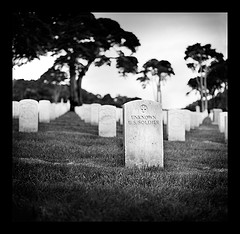
 If ever exposure to chemicals needs to be taken seriously, it’s in a war zone. However, it seems that defense contractor KBR, working in Iraq, may have ignored the dangerous effects of a spilled chemical on the health of area soldiers.
If ever exposure to chemicals needs to be taken seriously, it’s in a war zone. However, it seems that defense contractor KBR, working in Iraq, may have ignored the dangerous effects of a spilled chemical on the health of area soldiers.
Lt. Col. Jim Gentry had lung cancer, and passed away early in December of 2009-the first American soldier to die from exposure to a cancer-causing toxin while serving in Iraq. He commanded a 600-strong force that provided security for KBR’s refittal of the Qarmat Ali water-pumping plant, which provided water needed for oil extraction. In a lawsuit filed in 2008, Gentry and 15 others said that KBR was aware that soldiers and civilian contractors were exposed to the toxin months before they told the people working at the site.
The toxin is called “hexavalent chromium.” The Iraqis use it to prevent corrosion in the pipes that pump water into the ground at oil-pumping sites. Researchers have linked it to lung cancer and leukemia. It’s the same chemical that poisoned residents in California, in the case made famous by the movie “Erin Brokovich.” When doctors diagnosed Gentry in 2006, they identified his cancer as a rare form attributed to exposure to hexavalent chromium.
KBR took control of the Qarmat Ali facility after it had been looted and abandoned. Containers holding the chemical were slashed open during the looting, then spread about in wind storms. CNN reported that the guardsmen and contractors working at the facility described walking on and sitting near the bright orange powder that was widely dispersed throughout the grounds. “KBR managers knew full well long ago that this stuff was incredibly dangerous,” said Mike Doyle, one of the Houston attorneys representing the Guardsmen.
Gentry is quoted as having said he understood and accepted that danger was inherent in his line of service, but that “what’s very difficult for me to accept is if I’m working for KBR and they have knowledge of hazardous chemicals on the ground that can cause cancer and [they don’t] share that knowledge.” Indeed, former KBR employee Edward Blacke, a trained emergency medical technician, said that soldiers and contractors at the site were showing symptoms when he arrived there, including coughing up blood and dealing with severe eye, nose, and throat irritations.
Though Gentry’s is the first death attributed to exposure, it’s not the first case of health problems resulting from toxins. Many open burn pits-including the Balad Burn Pit-are spewing toxic plumes over Iraq and Afghanistan even today, spreading chemicals like arsenic, benzene, carbon monoxide, formaldehyde, sulfuric acid, toluene, and more over anyone standing nearby. James R. Elliott, Chief of Air Force Aeromedical Services, said the pit’s fumes contain “known carcinogens” and “respiratory sensitizers” that pose a “chronic and acute health hazard to our troops and the local population.” Though so far the government has downplayed the health risks, “Army Times” reporter Kelley Kennedy said that more than 100 service members had come forward with symptoms like chronic bronchitis, asthma, heart problems, lymphoma and leukemia.
As for KBR, the Gentry case isn’t the only problem on its list. The company is also accused of providing bathing water that was not disinfected, and of serving soldiers spoiled and expired food. Other soldiers, as well, are suffering the health effects of the exposure to hexavalent chromium-with severe nosebleeds, coughing up blood, and even lesions on their hands, arms, and faces.
“To knowingly omit, hide, and lie about the presence of the compound is true evil,” says one responder to the story. “These men should be given all the health care they need from now until the end.”
Have you, or someone you know, suffered health effects as a result of toxic exposure in a war zone? Please share your story.
Photo courtesy Joel Aron via Flickr.com.

